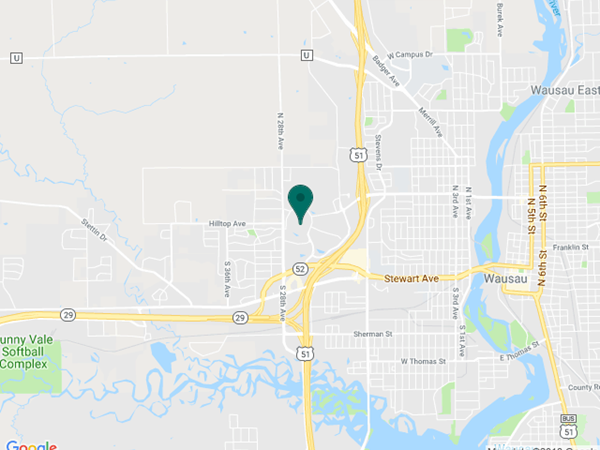Medical College of Wisconsin Central Wisconsin Psychiatry Residency Program
We are an ACGME accredited program that is part of an initiative of the Medical College of Wisconsin (MCW) to develop medical resources in the underserved areas of the state of Wisconsin. MCW established the MCW-Central Wisconsin Medical School Campus in Wausau with a class of 26 students in 2016 and graduated its first class in 2019. The Central Wisconsin Psychiatry Residency Program is another step in the direction to provide resources where they are most needed throughout the entire state.
Why become a resident at MCW?
A Message From Our Director | Jean Vogel, MD, Assistant Professor
 Welcome!
Welcome!
At Medical College of Wisconsin-Central Wisconsin Psychiatry Residency (MCW-CW), we’re proud to offer a program that blends strong clinical training with deep community connection. Our program will help you become a skilled psychiatrist, ready to make a difference in patients’ lives, contribute to the field, and assume positions of leadership.
Based in beautiful and accessible Wausau with key rotations in Ashland, Rhinelander, Tomah, and specialized experiences in Madison and Milwaukee, we offer rich training across a wide range of rural and urban settings. While caring for diverse, often underserved communities, you'll learn the art and science of psychiatry. In addition to psychopharmacology, you’ll be exposed to somatic therapies that extend beyond ACGME requirements as well as a wide range of psychotherapeutic skills that are applicable across all psychiatric encounters. One on one instruction and supervision will support your implementation of new knowledge as you build skills in child, adult, gero, integrative, and community psychiatry.
We pride ourselves on being a close-knit residency where engagement and collaboration are central. Residents from all post-graduate years work together, teach and learn from each other. Our faculty is committed to supporting and teaching trainees in learning environments where every resident’s professional identity is nurtured and unique strengths respected. Leadership opportunities are plentiful, whatever your interest, as are opportunities to participate in ongoing committees and projects within the program and community. In any form, your contributions matter.
Whether your passion is clinical mastery, innovation, teaching, publishing, advocacy, and/or administration, we’ll help you find your path and thrive on it. At MCW-CW, you’ll discover a welcoming place where close connections and futures are built.
Our Mission
- Train Skilled, Compassionate Psychiatrists - Prepare residents to become thoughtful, capable clinicians who provide high-quality, patient-centered psychiatric care across a variety of settings.
- Promote a Collaborative Learning Culture - Create a respectful and supportive training environment where mentorship, collaboration, and personal growth are central.
- Foster Leadership and Innovation - Equip residents to take on leadership roles in clinical practice, education, research, advocacy, and systems-level change.
- Serve Diverse and Underserved Communities - Address mental health disparities by training physicians committed to meeting the needs of rural and underserved populations in Wisconsin and beyond.
- Integrate Community Engagement with Medical Education - Build strong ties between residency training and community needs with meaningful contributions through community service, projects, and local partnerships
About Jean Vogel, MD
Biography
Jean Vogel, MD, is a board-certified psychiatrist/psychoanalyst with over twenty five years of experience in academic and clinical psychiatry. An Assistant Professor in the Medical College of Wisconsin (MCW) Department of Psychiatry, she is also Director of the Outpatient Department at North Central Health Care in Wausau, WI. Before joining MCW, Dr. Vogel served as Assistant Clinical Professor at Yale University School of Medicine and held leadership positions at the Western New England Institute for Psychoanalysis (WNEIP), including Chair of Continuing Education and Vice President of the Institute Board, while seeing patients in her own clinical practice.
Dr. Vogel has been recognized by both MCW and the Connecticut Psychiatric Society for Clinical Excellence in Teaching and Service to Patients and she is a Lifetime Fellow of the American Psychiatric Association (APA). Her scholarly work includes recent publications on countertransference in psychiatric treatments and the intersection of literature and psychoanalytic theory. She is currently editing and authoring a Guide to Outpatient Care under contract with the APA.
With an extensive background in both psychopharmacology and theories of mind, Dr Vogel provides well-rounded leadership. Her focus on curriculum development, mentorship, and interdisciplinary collaboration fosters a learning environment for the next generation of psychiatrists that is intellectually stimulating, emotionally attuned, and grounded in real-world clinical excellence.
A Day in the Life of a Rural Psychiatry Resident
Shivani Gundamraj, DO, PGY-2, shares her experiences as a resident in the MCW-Central Wisconsin Psychiatry Residency Program.
Program Information
Contact Us
MCW-Central Wisconsin
1900 Westwood Dr., Suite 3100
Wausau, WI 54401-4106


